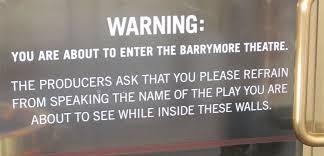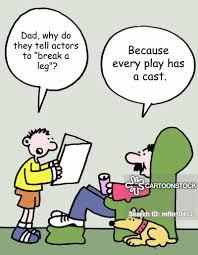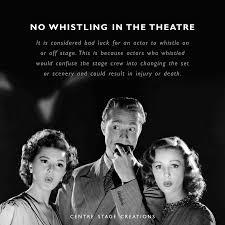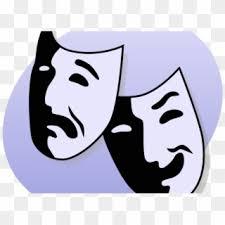Results: Never say Macbeth On Stage And Other Theatre Superstitions
Published on 08/07/2020
QUESTIONS
GO to COMMENTS
Comments
1.
1.
Theatres around the world may still be "dark" but that won't stop this survey from shedding some "light" on the reasons for some theatre superstitions. One of the most well known ones is "Never mention "Macbeth" in a theatre". Even whispering the name of one of William Shakespeare's bloodiest plays inside a theatre is taboo. There are a variety of speculations as to why saying the play's name in a theatre is considered bad luck. One possible reason comes from the incantations of the three witches in Macbeth. It is believed that Shakespeare adapted these spells from actual books of black magic. This opened the play up to forces of darkness which are supposed to plague productions of what most now refer to as "The Scottish Play." Another theory claims that the actor playing Macbeth in the original production died in an accident, and Shakespeare, himself, had to go on in his place. It is believed that all subsequent productions are now haunted by this actor and his dismal fate. Have you heard any of these origins?

Yes, the one about the witches
5%
116 votes
Yes, the one about the actor who died playing "you know who"
4%
95 votes
Both of these
7%
170 votes
Something else
3%
69 votes
Heard the superstition, but not the reasons
11%
256 votes
Have never heard this superstition
70%
1651 votes
2.
2.
Another superstition, or rather theatre lingo we have probably all heard is saying "Break a Leg" instead of good luck to the performers. Some believe there are theatre ghosts or fairies who like to cause mischief by making the opposite of what you want to have happen occur. Phrases like "break a leg" and "merde" are meant to confuse these theatrical pixies and defeat their obstinate ways. A wish for something bad will yield something good from them. Which of these reasons for saying specifically "break a leg" have you heard?

The widely-accepted explanation is that the "leg" being referred to is not the human appendage, but rather the curtain that hangs in the wings, masking the backstage. Breaking a leg means you have broken past this barrier and made it successfully onstage!
12%
286 votes
Other theories support that "break a leg" goes much further back, perhaps to Elizabethan England, where audiences threw money when they enjoyed a performance (fruits and vegetables for a bad one). Actors would have to bend over to collect their rewards, thus breaking the line of their leg. Money = Breaking legs = Success.
9%
206 votes
None of them
48%
1137 votes
I've heard something else
10%
239 votes
Have never heard the term "break a leg" used regarding the theatre
14%
336 votes
To break a leg was to hope the actor would have so many curtain calls that his trousers would be creased permanently.
9%
210 votes
In Shakespeare's time, to break meant to bend. So, bend your leg, means take a lot of bows.
7%
175 votes
In Ancient Greece, people didn't applaud. Instead, they stomped for their appreciation and if they stomped long enough, they would break a leg.
3%
77 votes
Some would have it that the term originated during Elizabethan times when, instead of applause the audience would stomp their chairs – and if they liked it enough, the leg of the chair would break.
4%
99 votes
3.
3.
Have you heard any of these theatre superstitions, and their origins?

Do not whistle in the theatre -- back in the 1600's, since the rigging of theatrical fly systems was very similar to that of many sailing ships, many sailors found work in the theatre crew. On the seas, sailors communicated to each other through a code of whistling. When they began working in theatre, this means of communication followed. A certain combination of whistles could mean instructions to raise or lower scenery. If an actor happened to go across the stage whistling, the operators of the fly system might easily be confused.
9%
208 votes
Avoid placing a peacock feather onstage -- The pattern on a peacock feather creates an eye, or (according to legend) an evil eye, which brings bad luck to a production. The idea of the evil eye hidden in objects extends back as far as the Ancient Greeks. Peacock feathers were also feared by early Europeans as they were part of the ornamentation of Mongol hordes who invaded parts of the continent during the Middle Ages. For a long time, peacock feathers were looked upon by Europeans as part of a dark and bloody history.
7%
169 votes
Never leave a stage entirely dark -- Practicality might be part of it, since there is always many obstacles (furniture, trap doors, and orchestra pits) that could lead to accidents in the dark. But there is a second common sense explanation. When theatres were first lit in the early part of the 1800s — before electricity — the lights were powered by gas. Gas is, of course, combustible and could build up pressure within the gas lines. Running the flame of a ghost light in a theatre during non-performance times burned excess gas and eliminated the pressure that might result in an explosion. To this day, a "ghost" light is always left on.
10%
245 votes
None of these
80%
1880 votes
4.
4.
Actors and theatre people are very superstitious and they will follow these ones, no matter how ridiculous, to the letter to ensure a successful play run. Have you heard about any of these superstitions?

Do not give gifts of flowers before the performance
7%
159 votes
Wearing blue and yellow together will cause the actors to forget their lines
2%
51 votes
A bad dress rehearsal means a great opening night
13%
302 votes
Wearing green is unlucky
3%
72 votes
Never use brand new makeup for the opening night performance
4%
94 votes
Absolutely no knitting in the wings.
3%
63 votes
Always exit the dressing room left foot first.
5%
120 votes
Never speak the last line of a play before opening night.
4%
87 votes
Nev er open a show on a Friday night
4%
84 votes
No real flowers, mirrors or jewellery should ever be used on stage.
3%
74 votes
You should use a rabbit's foot to apply makeup.
2%
54 votes
You should never clean your makeup box.
2%
46 votes
Never place shoes or hats on chairs or tables inside the dressing rooms
4%
85 votes
Have never heard any of these
73%
1714 votes
COMMENTS


